过去式总结及练习
小学一般过去时专项训练题及答案
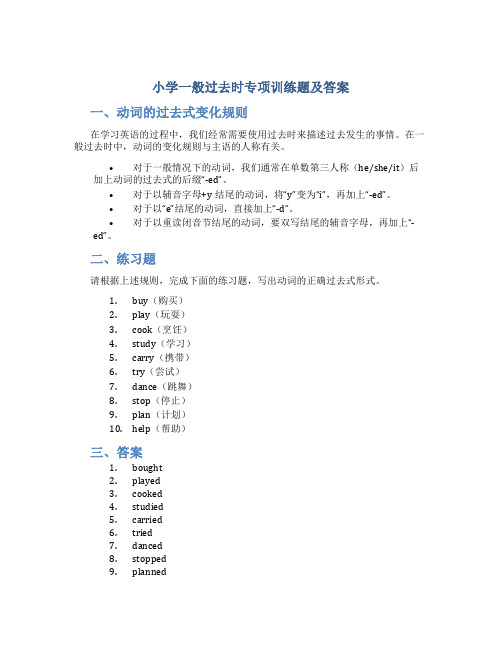
小学一般过去时专项训练题及答案一、动词的过去式变化规则在学习英语的过程中,我们经常需要使用过去时来描述过去发生的事情。
在一般过去时中,动词的变化规则与主语的人称有关。
•对于一般情况下的动词,我们通常在单数第三人称(he/she/it)后加上动词的过去式的后缀“-ed”。
•对于以辅音字母+y结尾的动词,将“y”变为“i”,再加上“-ed”。
•对于以“e”结尾的动词,直接加上“-d”。
•对于以重读闭音节结尾的动词,要双写结尾的辅音字母,再加上“-ed”。
二、练习题请根据上述规则,完成下面的练习题,写出动词的正确过去式形式。
1.buy(购买)2.play(玩耍)3.cook(烹饪)4.study(学习)5.carry(携带)6.try(尝试)7.dance(跳舞)8.stop(停止)9.plan(计划)10.help(帮助)三、答案1.bought2.played3.cooked4.studied5.carried6.tried7.danced8.stopped9.planned10.helped四、知识点总结通过以上练习题,我们了解了动词在一般过去时中的变化规则。
掌握这些规则对于正确使用过去时非常重要。
需要注意的是,一些不规则动词的过去式形式并不按照常规的规则来变换。
因此,在学习过程中,我们需要特别注意这些不规则动词,并进行针对性的练习和记忆。
希望以上的练习题对于小学生来说能够帮助加深对一般过去时的理解,提高正确使用过去时的能力。
祝大家学习进步!。
一般过去时词的过去式变化规则和练习
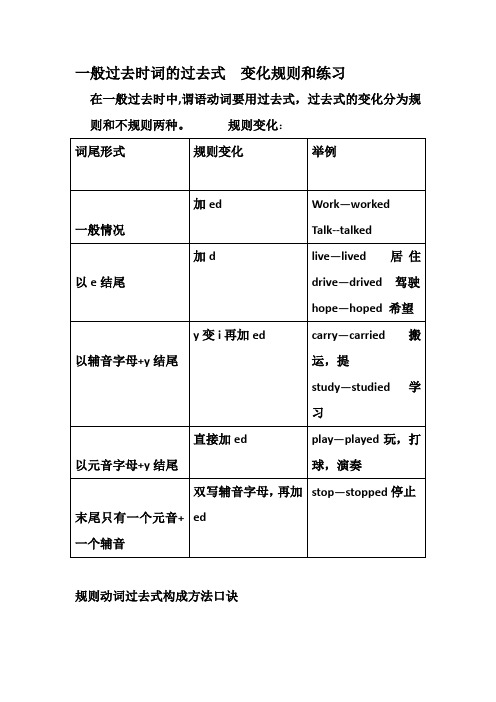
一般过去时词的过去式变化规则和练习在一般过去时中,谓语动词要用过去式,过去式的变化分为规则和不规则两种。
规则变化:规则动词过去式构成方法口诀过去式构成有规律,一般词尾加ed ,如果词尾有个e, 只要直接加上d,辅音字母加上y, 变y为i加ed, 一个元音一个辅音,双写词尾加ed●过去式词的练习try____ cry____ stay____ walk____ watch____ open____ close____ rain____ turn_____ arrive______ help______ listen______ change____ look____ reply ____ want____ beg____ plan____ prefer ____ like ______ dance______ love____ look _____ tidy____ wash_____● 1. I ____ ( work) to the school yesterday.2.She ____ (drive) a bus before.3. It ____ (rain) lastSunday.4. The dog _____ (help) the blind man two years ago.5. I ____ (listen) to the music last night.6. The little sister _____ (dance) last night.7. The bus _____(stop) yesterday afternoon.8. We _____(tidy) up the room. 9. I ______(close) thewindow yesterday .10. I ____(like) to eat apple before. 11. I ______(wash) myT-shirt.12. They ____(dance) together last night. 14. The old man _____(beg) on13. He _____( reply) to the letter yesterday. the street.。
小学英语一般过去时总结及练习(五年级上册)
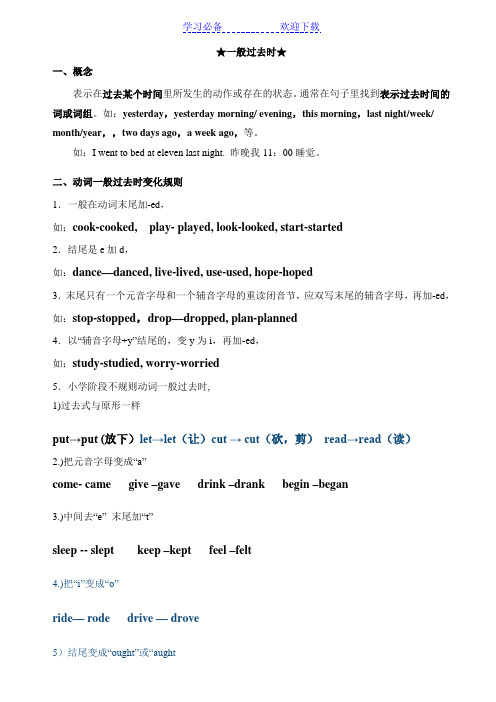
★一般过去时★一、概念表示在过去某个时间里所发生的动作或存在的状态。
通常在句子里找到表示过去时间的词或词组。
如:yesterday,yesterday morning/ evening,this morning,last night/week/ month/year,,two days ago,a week ago,等。
如:I went to bed at eleven last night. 昨晚我11:00睡觉。
二、动词一般过去时变化规则1.一般在动词末尾加-ed,如:cook-cooked, play- played, look-looked, start-started2.结尾是e加d,如:dance—danced, live-lived, use-used, hope-hoped3.末尾只有一个元音字母和一个辅音字母的重读闭音节,应双写末尾的辅音字母,再加-ed,如:stop-stopped,drop—dropped, plan-planned4.以“辅音字母+y”结尾的,变y为i,再加-ed,如:study-studied, worry-worried5.小学阶段不规则动词一般过去时,1)过去式与原形一样put→put (放下)let→let(让)cut → cut(砍,剪)read→read(读)2.)把元音字母变成“a”come- came give –gave drink –drank begin –began3.)中间去“e” 末尾加“t”sleep -- slept keep –kept feel –felt4.)把“i”变成“o”ride— rode drive — drove5)结尾变成“ought”或“au ghtthink -thought buy- bought bring- brought catch –caught buy—bought6)“ow”或“aw”变成“”ewknow- knew throw –threw draw –drew7)结尾”d”变“t”build- built spend-spent8)剩余不规则动词表am, is-was are –were do,does-did go-wentmake-made write-wrote take—took run—ran see—saw learn—learnt speak—spoke meet—met wear—wore get –got ring—rang tell—told lose—lost smell—smelt say—said sing—sang send—sent forget—forgot can—could hear—heard sit—sat eat-ate fall off—fell off have、has—had三、句式变化1.(be动词类)在表示过去存在的状态的句子中在was, were的后面加上not。
一般过去式的用法及习题

一般过去式的用法及习题一般过去式是表示过去某一时间发生的动作或存在的状态,常与表示过去的时间状语连用,如yesterday, last night, in 1990等。
以下是一般过去式的用法及习题:1、表示过去发生的动作或存在的状态,常与yesterday, last night, in 1990等时间状语连用。
例如:1、I saw a movie yesterday.我昨天看了一部电影。
2、He was born in 1990.他出生于1990年。
2、表示过去经常或反复发生的动作,常与always, often等频度副词连用。
例如:1、He always went to the park in the morning.他过去总是在早上到公园散步。
2、She often used to read books in the evening.她过去常常在晚上看书。
3、表示过去某一段时间内发生的动作或存在的状态,常与for,during等介词连用。
例如:1、I studied English for three years.我学了三年英语。
2、They lived in China during the 1980s.他们在20世纪80年代住在中国。
4、表示过去某个时间点或时刻发生的动作或存在的状态,常与at, on 等介词连用。
例如:1、He arrived at the airport at 3 o'clock yesterday afternoon.他昨天下午三点到达机场。
2、On my way home, I met an old friend.在回家的路上,我遇到了一位老朋友。
5、表示过去某个特定时间发生的动作或存在的状态,常与on one's way to等短语连用。
例如:1、On my way to school, I saw a beautiful sunrise.在我去学校的路上,我看到了美丽的日出。
动词过去式变化及练习题
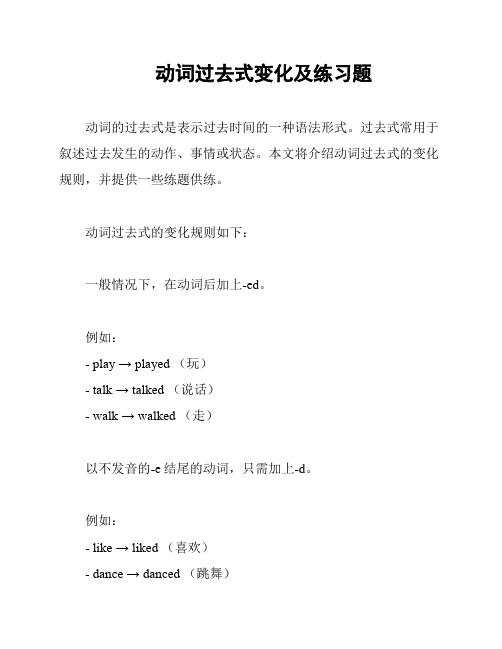
动词过去式变化及练习题动词的过去式是表示过去时间的一种语法形式。
过去式常用于叙述过去发生的动作、事情或状态。
本文将介绍动词过去式的变化规则,并提供一些练题供练。
动词过去式的变化规则如下:一般情况下,在动词后加上-ed。
例如:- play → played (玩)- talk → talked (说话)- walk → walked (走)以不发音的-e结尾的动词,只需加上-d。
例如:- like → liked (喜欢)- dance → danced (跳舞)- close → closed (关闭)以重读闭音节结尾的动词,且末尾只有一个辅音字母,则双写这个辅音字母后再加-ed。
例如:- stop → stopped (停止)- plan → planned (计划)- prefer → preferred (更喜欢)以下是一些练题供练动词过去式的变化:1. He ________ (watch) a movie last night.2. I ________ (study) English for two hours yesterday.3. She ________ (cook) dinner yesterday evening.4. They ________ (visit) their grandparents last weekend.5. We ________ (play) soccer in the park yesterday.参考答案:1. watched2. studied3. cooked4. visited5. played希望本文能帮助你掌握动词过去式的变化规则,加强对过去时态的理解。
练题可以帮助你巩固所学知识,提高动词过去式的运用能力。
初级练习题常见动词的过去式练习

初级练习题常见动词的过去式练习过去式练习一、动词过去式动词分为三种时态:一般现在时、一般过去时和将来时。
其中,一般过去时用于过去已经发生的动作或状态。
动词的过去式通常由动词原形后面加上-ed或者不规则变化而成。
本文将针对常见的动词过去式进行练习。
1. walk(走)过去式:walked例句:I walked to school yesterday.(昨天我走路去学校。
)2. play(玩)过去式:played例句:She played the piano at the concert.(她在音乐会上弹奏钢琴。
)3. study(学习)过去式:studied例句:He studied hard for the exam.(他为了考试而努力学习。
)4. eat(吃)过去式:ate例句:They ate dinner together last night.(他们昨晚一起吃晚餐。
)5. run(跑)过去式:ran例句:He ran fast and won the race.(他跑得很快,并赢得了比赛。
)6. write(写)过去式:wrote例句:She wrote a letter to her friend.(她给她的朋友写了一封信。
)7. sleep(睡觉)过去式:slept例句:I slept well last night.(昨晚我睡得很好。
)8. drink(喝)过去式:drank例句:They drank orange juice at the party.(他们在派对上喝橙汁。
)9. swim(游泳)过去式:swam例句:We swam in the pool yesterday.(我们昨天在游泳池里游泳。
)10. speak(说话)过去式:spoke例句:He spoke English fluently.(他流利地说英语。
)二、练习题根据句子的要求,填入适当的动词过去式。
1. Last night, they __________ (watch) a movie together.2. She __________ (visit) her grandparents last summer.3. We __________ (play) soccer in the park yesterday.4. He __________ (clean) his room this morning.5. Mary __________ (dance) at the party last night.6. They __________ (buy) a new car last week.7. I __________ (visit) my friend in the hospital yesterday.8. He __________ (study) French for three years.9. We __________ (travel) to Beijing last month.10. The children __________ (paint) pictures in art class yesterday.三、答案解析1. watched2. visited3. played4. cleaned5. danced6. bought7. visited8. studied9. traveled10. painted四、总结通过上述练习,我们巩固了常见动词的过去式变化规则。
超详细一般过去时的全面讲解【附练习与答案】
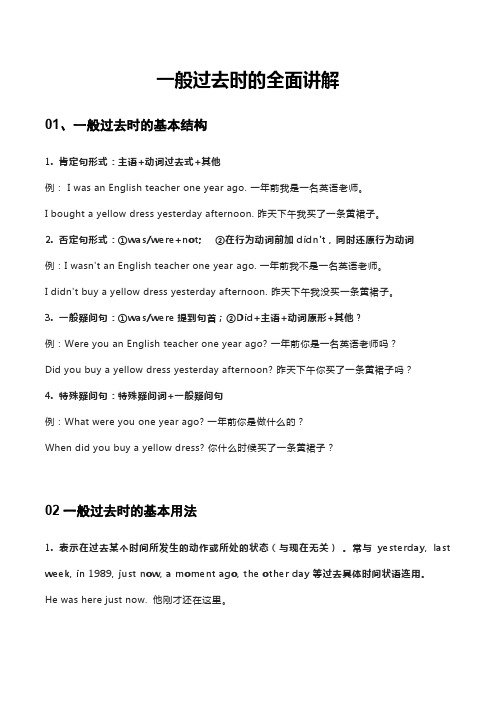
一般过去时的全面讲解01、一般过去时的基本结构1. 肯定句形式:主语+动词过去式+其他例: I was an English teacher one year ago. 一年前我是一名英语老师。
I bought a yellow dress yesterday afternoon. 昨天下午我买了一条黄裙子。
2. 否定句形式:①was/were+not; ②在行为动词前加didn't,同时还原行为动词例:I wasn't an English teacher one year ago. 一年前我不是一名英语老师。
I didn't buy a yellow dress yesterday afternoon. 昨天下午我没买一条黄裙子。
3. 一般疑问句:①was/were提到句首;②Did+主语+动词原形+其他?例:Were you an English teacher one year ago? 一年前你是一名英语老师吗?Did you buy a yellow dress yesterday afternoon? 昨天下午你买了一条黄裙子吗?4. 特殊疑问句:特殊疑问词+一般疑问句例:What were you one year ago? 一年前你是做什么的?When did you buy a yellow dress? 你什么时候买了一条黄裙子?02一般过去时的基本用法1. 表示在过去某个时间所发生的动作或所处的状态(与现在无关)。
常与yesterday, last week, in 1989, just now, a moment ago, the other day等过去具体时间状语连用。
He was here just now. 他刚才还在这里。
What did you do yesterday? 你昨天做了什么事?2. 在过去一段时间内的经常性或习惯性动作。
小学英语动词过去式变化总结及练习题
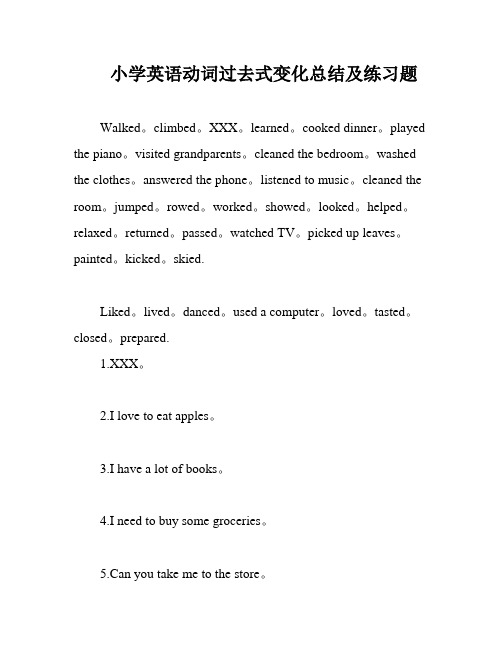
小学英语动词过去式变化总结及练习题Walked。
climbed。
XXX。
learned。
cooked dinner。
played the piano。
visited grandparents。
cleaned the bedroom。
washed the clothes。
answered the phone。
listened to music。
cleaned the room。
jumped。
rowed。
worked。
showed。
looked。
helped。
relaxed。
returned。
passed。
watched TV。
picked up leaves。
painted。
kicked。
skied.Liked。
lived。
danced。
used a computer。
loved。
tasted。
closed。
prepared.1.XXX。
2.I love to eat apples。
3.I have a lot of books。
4.I need to buy some groceries。
5.Can you take me to the store。
6.Let's go XXX7.I XXX English in China for a year。
8.I ran a marathon last weekend。
9.XXX10.I usually get up at 7am。
11.I XXX。
12.Birds can fly in the sky。
13.Let'XXX14.I slept for 10 hours last night。
15.XXX。
16.I need to do my homework。
17.Can you help me make the bed。
18.I drew a picture of a cat。
19.I XXX。
20.XXX21.XXX。
22.XXX。
英语一般过去时总结和练习含答案百度文库
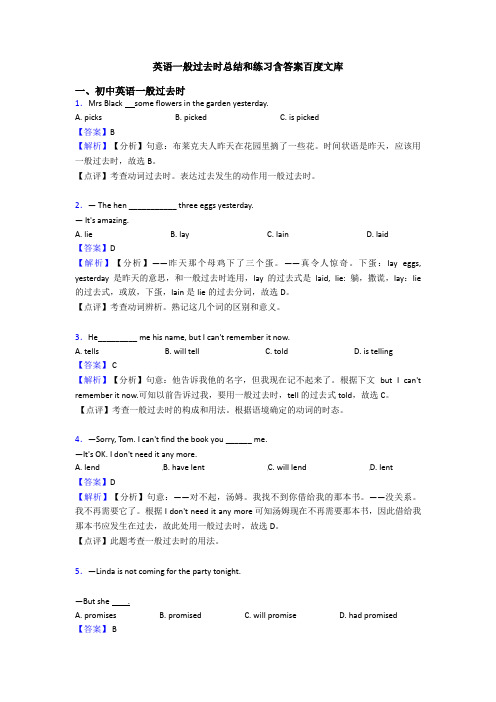
英语一般过去时总结和练习含答案百度文库一、初中英语一般过去时1.Mrs Black some flowers in the garden yesterday.A. picksB. pickedC. is picked【答案】B【解析】【分析】句意:布莱克夫人昨天在花园里摘了一些花。
时间状语是昨天,应该用一般过去时,故选B。
【点评】考查动词过去时。
表达过去发生的动作用一般过去时。
2.— The hen ___________ three eggs yesterday.— It's amazing.A. lieB. layC. lainD. laid【答案】D【解析】【分析】——昨天那个母鸡下了三个蛋。
——真令人惊奇。
下蛋:lay eggs, yesterday是昨天的意思,和一般过去时连用,lay的过去式是laid, lie: 躺,撒谎,lay:lie 的过去式,或放,下蛋,lain是lie的过去分词,故选D。
【点评】考查动词辨析。
熟记这几个词的区别和意义。
3.He_________ me his name, but I can't remember it now.A. tellsB. will tellC. toldD. is telling【答案】 C【解析】【分析】句意:他告诉我他的名字,但我现在记不起来了。
根据下文but I can't remember it now.可知以前告诉过我,要用一般过去时,tell的过去式told,故选C。
【点评】考查一般过去时的构成和用法。
根据语境确定的动词的时态。
4.—Sorry, Tom. I can't find the book you ______ me.—It's OK. I don't need it any more.A. lendB. have lentC. will lendD. lent【答案】D【解析】【分析】句意:——对不起,汤姆。
一般过去时态总结与习题

一般过去时总结与练习题一构成⑴ be→was— ( am, is 的过去式)were— ( are 的过去式)⑵ V. →V-ed ( 动词过去式)二用法⑴表示过去发生的动作或状态,通常会有明确的表示过去的时间状语。
I went to the zoo yesterday.I stayed up last night ..⑵叙述过去连续发生的动作或状态。
This morning , I got up early , went out for a walk , then came back and cooked for my family .⑶表示过去某一段不确定的时间内发生的动作或状态。
He worked in the store for 5 years.⑷讲故事时用一般过去时,但描述故事发生的背景时用过去进行时。
⑸ used to do sth. 过去常常(习惯)做某事be used to doing sth 一直习惯做某事I used to get up early. 我过去常常早起.I am used to getting up early.我一直都习惯于早起.三、带有确定的过去时间状语时,要用过去时如:yesterday(昨天)、two days ago…(两天前……)、last year…(去年…)、the otherday(前几天)、once upon a time(很久以前)、just now(刚才)、in the old days(过去的日子里)、before liberation(解放前…)、When I was 8 years old(当我八岁时…)、at+一个时间点四、公式⑴be→was / were肯:S.+ was∕were+…否:S.+ wasn’t / weren’t +…肯疑:Was∕Were + S. +…?Yes, S.+ was∕were.No, S.+ wasn’t∕weren’t.否疑:Wasn’t∕Weren’t + S. +…?Yes, S. + was∕were.No, S.+ wasn’t∕weren’t.⑵V. →V-ed肯:S. + V-ed+…否:S. + did not (didn’t )+ V原+…肯疑:Did + S. + V原+…?Yes, S.+ did.No, S.+ didn’t.否疑:Didn’t + S. + V原+…?Yes, S.+ did.No, S.+ didn’t.一、用动词合适的形式填空1.I _____ (watch) a cartoon on Saturday.2. Her father ______(read) a newspaper last night.3. We ______ to zoo yesterday, we _____ to the park. (go)4. _____ you _____ (visit) your relatives last Spring Festival?5. ______ he ______(fly) a kite on Sunday? Yes, he ______.6. Gao Shan _______(put) up the picture last night.7. I _______ (sweep) the floor yesterday, but my mother ____.8. What ______ she ______(find) in the garden last morning? She _______(find) a beautiful butterfly.9. How _______(be) Jim's weekend? It _______(be not) bad.10. ________ (be) your mother a sales assistant last year? No. she __________.11. I _______(have) an exciting party last weekend.12. _________ she ______(practice) her guitar yesterday? No, she _________.13. What ________ Tom _____ (do) on Saturday evening?He ________(watch) TV and ______(read) an interesting book.14. They all ______(go) to the mountains yesterday morning.15. She ______(not visit) her aunt last weekend.She ________ (stay) at home and ______(do) some cleaning.16. When ______ you ______(write) this song?I _______(write) it last year.17. My friend, Carol, ________(study) for the math test and _ ___(practice) English last night.18. ________ Mr. Li _____(do) the project on Monday morning? Yes, he ___二、句型转换1. The children had a good time in the park.否定句:__________________________________________一般疑问句:________________________________________对划线部分提问:____________________________________ 2. There were about nine hundred people at the concert.否定句:__________________________________________一般疑问句:________________________________________ 对划线部分提问:____________________________________ 3. Ann did her homework yesterday evening.否定句:__________________________________________ 一般疑问句:________________________________________ 对划线部分提问:____________________________________ 4. Last week I read an English book.否定句:__________________________________________ 一般疑问句:________________________________________ 肯定/否定回答:____________________________________ 对划线部分提问:____________________________________ 5. My brother was in the park just now.否定句:__________________________________________ 一般疑问句:________________________________________ 对划线部分提问:____________________________________ 三、写出下列动词的第三人称单数形式、过去式形式go _______ _______ enjoy _______ _______buy _______ _______ eat _______ _______get _______ _______ walk _______ _______take _______ _______ dance _______ _______write _______ _______ run _______ _______swim _______ _______ find _______ _______begin _______ _______ eat _______ _______play _______ _______ study _______ _______四、用所给词的适当形式填空。
小学语法规则动词的过去式及练习含答案

小学语法规则动词的过去式及练习一般过去时中的动词通常用动词的过去式形式来表示,而动词的过去式是在动词原形的基础上变化的。
动词的过去式可以分为规则动词过去式和不规则动词过去式。
一、规则动词的过去式变化如下:(1)一般情况下在动词原形后直接加-ed。
如:help→helped want→wanted work→workedact →acted look →looked call →calledopen→opened need →needed listen →listenedwash →washed(2)以不发音的字母e结尾的动词,直接加-d。
如:live→liveduse→usedlike→likedhope →hoped(3)以一个辅音字母结尾的重读闭音节动词,双写词尾辅音字母,再加-ed。
如: stop →stopped plan →planned fit →fitted(4)以辅音字母+y结尾的动词变y为i,再加-ed。
如:study→studied worry →worried try→triedcopy→copied cry→cried carry →carried(5)以元音字母加y结尾的词,直接加-ed。
如: play→played enjoy →enjoyedstay →stayed二、规则动词过去式的读音也有规律可循。
口诀:清后/t/,元浊/d/, /t//d/之后读/id/。
(1)清辅音/p//k//f/ /s/等后,ed要读/t/。
如:ask→asked /a:skt/cook→cooked /kukt/pass→passed /pa:st/(2)元音或浊辅音/b//g//v//z//m/等后,ed要读/d/。
如:move→moved /mu:vd/live →lived/livd/listen →listened //lisndstay→stayed /steid/(3)/t/或/d/后,ed读/id/。
动词过去式变化规则与其练习(含答案)
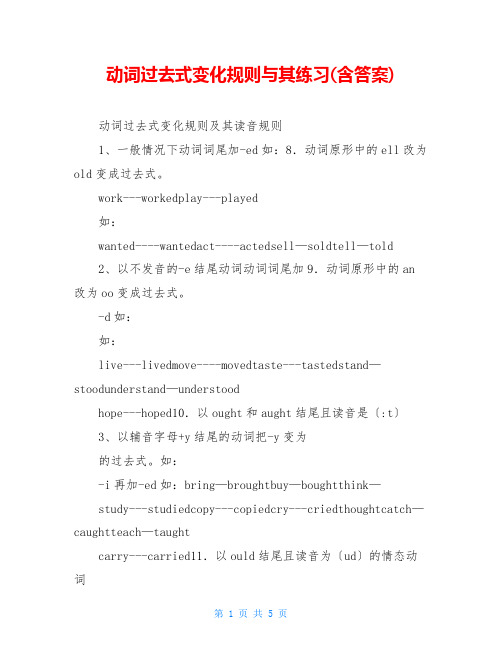
动词过去式变化规则与其练习(含答案)动词过去式变化规则及其读音规则1、一般情况下动词词尾加-ed如:8.动词原形中的ell改为old变成过去式。
work---workedplay---played如:wanted----wantedact----actedsell—soldtell—told2、以不发音的-e结尾动词动词词尾加9.动词原形中的an 改为oo变成过去式。
-d如:如:live---livedmove----movedtaste---tastedstand—stoodunderstand—understoodhope---hoped10.以ought和aught结尾且读音是〔:t〕3、以辅音字母+y结尾的动词把-y变为的过去式。
如:-i再加-ed如:bring—broughtbuy—boughtthink—study---studiedcopy---copiedcry---criedthoughtcatch—caughtteach—taughtcarry---carried11.以ould结尾且读音为〔ud〕的情态动词4、以一个辅音字母结尾的重读闭音节动词过去式。
如:双写词尾辅音字母再加-ed如:can—couldshall—shouldwill—wouldstop---stopped12.把动词原形中的o改为a变成过去式。
5、不规则动词的过去式变化规律性不强如:须多加记忆。
e—camebee—becamego–wentmake–madeget–gotbuy-bought13.在动词原形后加d或t变成过去式并e-camefly-flew且发生音变。
如:不规则动词的过去式的构成hear〔hi〕—heard〔h:d〕say 〔sei〕—said〔sed〕mean〔mi:n〕—meant〔ment〕1.把动词原形中的i 改为a变成过去式。
如:14.动词的过去式与动词原形一样。
如:begin—begandrink—drankgive—gavelet—letmust—mustput—putread—read〔red〕ring—rangsing—sangsit—satswim—swam15.不符合上述规律的动词过去式。
小学英语过去式讲解(附练习及答案)
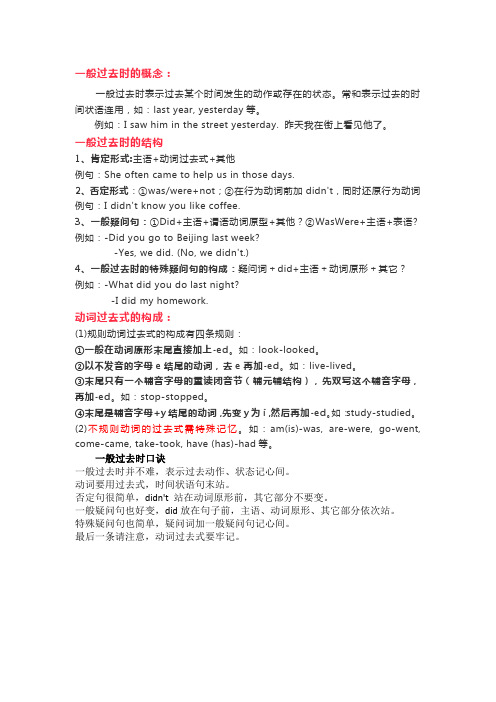
一般过去时的概念:一般过去时表示过去某个时间发生的动作或存在的状态。
常和表示过去的时间状语连用,如:last year, yesterday等。
例如:I saw him in the street yesterday. 昨天我在街上看见他了。
一般过去时的结构1、肯定形式:主语+动词过去式+其他例句:She often came to help us in those days.2、否定形式:①was/were+not;②在行为动词前加didn't,同时还原行为动词例句:I didn't know you like coffee.3、一般疑问句:①Did+主语+谓语动词原型+其他?②WasWere+主语+表语?例如:-Did you go to Beijing last week?-Yes, we did. (No, we didn't.)4、一般过去时的特殊疑问句的构成:疑问词+did+主语+动词原形+其它?例如:-What did you do last night?-I did my homework.动词过去式的构成:(1)规则动词过去式的构成有四条规则:①一般在动词原形末尾直接加上-ed。
如:look-looked。
②以不发音的字母e结尾的动词,去e再加-ed。
如:live-lived。
③末尾只有一个辅音字母的重读闭音节(辅元辅结构),先双写这个辅音字母,再加-ed。
如:stop-stopped。
④末尾是辅音字母+y结尾的动词,先变y为i,然后再加-ed。
如:study-studied。
(2)不规则动词的过去式需特殊记忆。
如:am(is)-was, are-were, go-went, come-came, take-took, have (has)-had等。
一般过去时口诀一般过去时并不难,表示过去动作、状态记心间。
动词要用过去式,时间状语句末站。
否定句很简单,didn't 站在动词原形前,其它部分不要变。
动词过去式和过去分词练习 - 名词更换练习
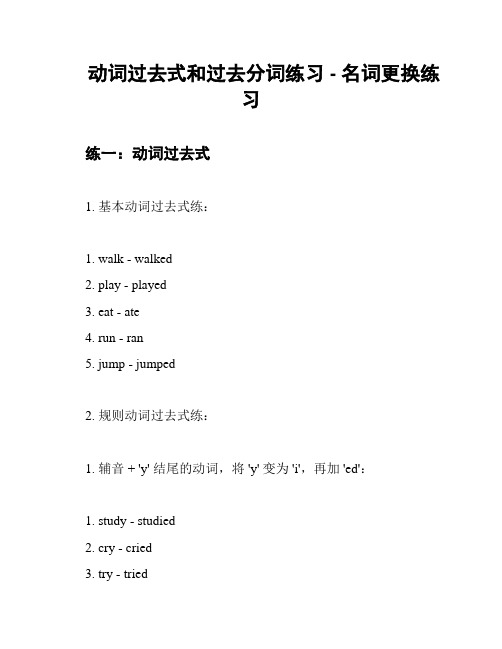
动词过去式和过去分词练习 - 名词更换练习练一:动词过去式1. 基本动词过去式练:1. walk - walked2. play - played3. eat - ate4. run - ran5. jump - jumped2. 规则动词过去式练:1. 辅音 + 'y' 结尾的动词,将 'y' 变为 'i',再加 'ed':1. study - studied2. cry - cried3. try - tried2. 元音 + 'e' 结尾的动词,直接加 'd':1. dance - danced2. smile - smiled3. bake - baked3. 以重读闭音节结尾的单词,先双写辅音字母,再加 'ed':1. stop - stopped2. plan - planned3. prefer - preferred练二:过去分词更换名词在英语中,过去分词有时可以作为名词使用。
下面是一些常见的过去分词在名词中的用法:1. chosen - 选择 (名词)例句:His choice was a good chosen.chosen.2. broken - 断裂 (名词)例句:The broken of the vase surprised everyone.broken of the vase surprised everyone.3. lost - 失去 (名词)例句:The lost of his keys caused him a lot of trouble.lost of his keys caused him a lot of trouble.4. seen - 视线 (名词)例句:He was suddenly caught in her seen.seen.5. given - 给予 (名词)例句:The given of the award made her happy.given of the award made her happy.以上是动词过去式和过去分词练习中的名词更换练习部分。
动词过去式及练习
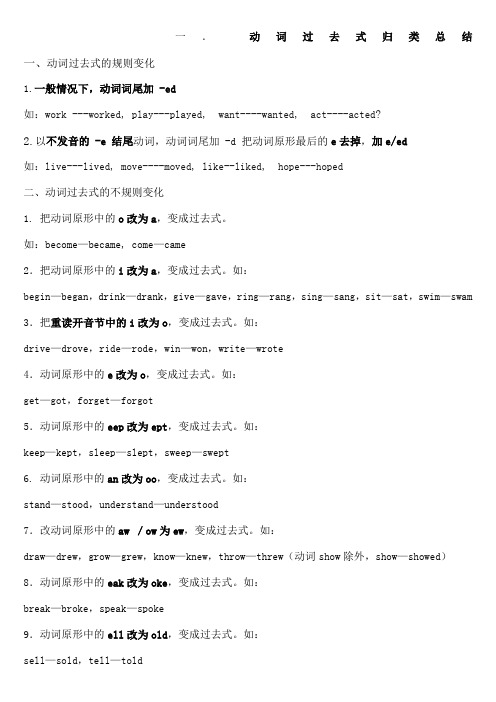
一.动词过去式归类总结一、动词过去式的规则变化1.一般情况下,动词词尾加 -ed如:work ---worked, play---played, want----wanted, act----acted?2.以不发音的 -e 结尾动词,动词词尾加 -d 把动词原形最后的e去掉,加e/ed如:live---lived, move----moved, like--liked, hope---hoped二、动词过去式的不规则变化1. 把动词原形中的o改为a,变成过去式。
如:become—became, come—came2.把动词原形中的i改为a,变成过去式。
如:begin—began,drink—drank,give—gave,ring—rang,sing—sang,sit—sat,swim—swam 3.把重读开音节中的i改为o,变成过去式。
如:drive—drove,ride—rode,win—won,write—wrote4.动词原形中的e改为o,变成过去式。
如:get—got,forget—forgot5.动词原形中的eep改为ept,变成过去式。
如:keep—kept,sleep—slept,sweep—swept6. 动词原形中的an改为oo,变成过去式。
如:stand—stood,understand—understood7.改动词原形中的aw /ow为ew,变成过去式。
如:draw—drew,grow—grew,know—knew,throw—threw(动词show除外,show—showed)8.动词原形中的eak改为oke,变成过去式。
如:break—broke,speak—spoke9.动词原形中的ell改为old,变成过去式。
如:sell—sold,tell—told10.以ought和aught结尾,且读音是[ :t]的过去式。
如:bring—brought,buy—bought,think—thought,catch—caught,teach—taught 11.以ould结尾且读音为[ud]的情态动词过去式。
(完整版)一般过去时讲解及练习
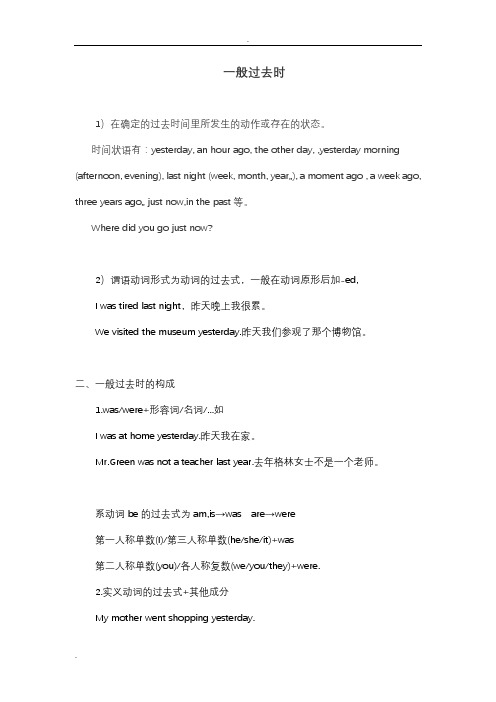
一般过去时1)在确定的过去时间里所发生的动作或存在的状态。
时间状语有:yesterday, an hour ago, the other day, ,yesterday morning (afternoon, evening), last night (week, month, year…), a moment ago , a week ago, three years ago… just now,in the past等。
Where did you go just now?2)谓语动词形式为动词的过去式,一般在动词原形后加-ed,I was tired last night,昨天晚上我很累。
We visited the museum yesterday.昨天我们参观了那个博物馆。
二、一般过去时的构成1.was/were+形容词/名词/...如I was at home yesterday.昨天我在家。
Mr.Green was not a teacher last year.去年格林女士不是一个老师。
系动词be的过去式为am,is→was are→were第一人称单数(I)/第三人称单数(he/she/it)+was第二人称单数(you)/各人称复数(we/you/they)+were.2.实义动词的过去式+其他成分My mother went shopping yesterday.我妈妈昨天去购物了。
His uncle worked in Beijing in 2014.他叔叔2014年在北京工作。
三、一般过去时的句式四、动词过去式的变化规则3 used toused to + do:"过去常常"表示过去习惯性的动作或状态,但如今已不存在。
Mother used to take a walk. (过去常常散步)二、构成及变化1. Be动词在一般过去时中的变化:am 和is在一般过去时中变为was。
四种过去时态讲解及习题总结

四种过去时态的讲解及习题(一)一般过去时一、一般过去时1.一般过去时表示过去某个时间发生的动作或存在的状态,常和表示过去的时间状语连用。
一般过去时也表示过去经常或反复发生的动作。
2.Be动词在一般过去时中的变化:⑴am 和is在一般过去时中变为was。
(was not=wasn't)⑵are在一般过去时中变为were。
(were not=weren't)⑶带有was或were的句子,其否定、疑问的变化和is, am, are一样,即否定句在was或were后加not,一般疑问句把was或were调到句首。
3.句中没有be动词的一般过去时的句子否定句:didn't +动词原形,如:Jim went home yesterday.Jim didn't go home yesterday.一般疑问句:在句首加did,句子中的动词过去式变回原形。
如:Jim went home yesterday.Did Jim go home yesterday?特殊疑问句:⑴疑问词+一般疑问句?如:Jim went home yesterday.Did Jim go home yesterday?What did Jim do yesterday?动词过去式变化规则:1.一般在动词末尾加-ed,如:pull-pulled, cook-cooked2.结尾是e加d,如:taste-tasted3.末尾是辅音字母加一个元音字母和一个辅音字母的重读闭音节,应双写末尾的辅音字母,再加-ed,如:stop-stopped4.以“辅音字母+y”结尾的,变y为i,再加-ed,如:study-studied5.不规则动词过去式:一般过去时练习Be动词的过去时练习(1)一、用be动词的适当形式填空1.I _______ at school just now.2.He ________ at the camp last week.3.We ________ students two years ago.4.They ________ on the farm a moment ago.5.Yang Ling ________ eleven years old last year.6.There ________ an apple on the plate yesterday.7.There ________ some milk in the fridge on Sunday.8.The mobile phone _______ on the sofa yesterday evening.二、句型转换1. It was exciting.否定句:________________________________________________ 一般疑问句:____________________________________________ 肯、否定回答:__________________________________________ 2. All the students were very excited.否定句:________________________________________________ 一般疑问句:____________________________________________ 肯、否定回答:__________________________________________ 3. They were in his pocket.否定句:________________________________________________ 一般疑问句:____________________________________________ 肯、否定回答:__________________________________________ Be动词的过去时练习(2)一、用be动词的适当形式填空1.I ______ an English teacher now.2.She _______ happy yesterday.3.They _______ glad to see each other last month.4.Helen and Nancy ________ good friends.5.The little dog _______ two years old this year.6.Look, there ________ lots of grapes here.7.There ________ a sign on the chair on Monday..8.Today _______ the second of June. Yesterday ______ the first of June. It _____ Children's Day. All the students ______ very excited.二、句型转换1. There was a car in front of the house just now.否定句:________________________________________________一般疑问句:____________________________________________肯、否定回答:__________________________________________肯、否定回答:__________________________________________三、中译英1. 我的故事书刚才还在手表旁边。
(完整版)小学英语动词过去式变化总结及练习题(最新整理)

直接加 edwalk 走climb 爬turn 转弯learn 学习cook dinner 做饭play the piano 弹钢琴visit grandparents 看望(外)祖父母clean the bedroom 打扫卧室wash the clothes 洗衣服answer the phone 接电话listen to music 听音乐clean the room 打扫房间jump 跳row 划work 工作show 展示look 看help 帮助relax 放松return 归还pass 传递watch TVpick up leaves 采摘树叶paint 绘画kick 踢ski 滑雪直接加 dlike 像,喜欢live 居住dance 跳舞use a computer 使用计算机love 爱taste 尝close 关上prepare 准备不规则变化eat 吃have 有;吃buy 买take 买;带go 去sing 唱歌teach(taught)教run(ran)跑fight(fought)打架get up 起床swim 游泳fly 飞swing(swung)荡sleep(slept)睡觉sweep(swept) the floor 扫地do 做make the bed 铺床draw(drew) pictures 画画write(wrote) a letter 写信catch (caught)butterflies 捉蝴蝶meet(met)见面drink(drank)喝tell(told)告诉ride(rode)骑find(found)寻找到drive(drove)驾驶come(came)来become(became)变成feel(felt)感觉到think(thought)思考meet(met)遇见fall(fell)落下leave 离开wake(woke) up 醒来bring 带来is am are see 看到grow 种植grew stand(stood)站立词形不变read books 读书put 放set the table 摆饭桌hit (hit)撞击、打cut 切、割最后一个字母双写再加 edstop(stopped)停shop 购物把 y 变成 i 再加 edempty the trash 倒垃圾一、单项选择( ) 1. The girl a red sweater is duty today.A. in, onB. in, inC. on, inD. on, on( ) 2. It’s very cold, your coat, please, Kate.A. put offB. put onC. puts onD. put in( ) 3. —— What day is today?—— It's .A. MondayB. a fine dayC. September 1stD. weekday ( ) 4. Shall we home?A. goB. goingC. goesD. went( ) 5. How much is the hot dog?A. TwoB. Three dollarsC. Four hot dogsD. Very much ( ) 6. Whose book is it? It’s not book, It’sA. my ,herB. mine ,hersC. My , hersD.mine,she二、阅读下面短文,选出最佳选项,将其序号填入提前括号内。
- 1、下载文档前请自行甄别文档内容的完整性,平台不提供额外的编辑、内容补充、找答案等附加服务。
- 2、"仅部分预览"的文档,不可在线预览部分如存在完整性等问题,可反馈申请退款(可完整预览的文档不适用该条件!)。
- 3、如文档侵犯您的权益,请联系客服反馈,我们会尽快为您处理(人工客服工作时间:9:00-18:30)。
一般过去时的用法及结构1.一般过去时的基本用法一般过去时表示过去某个时间发生的动作或存在的状态,也可表示过去经常或反复发生的动作。
常和表示过去的时间状语连用,如yesterday, last week, last night, in 2003, two days ago等。
【举例】I got up at 6:30 yesterday. 我昨天6:30起床。
My father was very busy last week. 我父亲上周很忙。
2.一般过去时的基本结构⑴肯定句“主语+动词过去式+其他”或者“主语+was/were+其他”。
【举例】I played tennis last weekend. 我上周末打网球了。
My school trip was great. 我的学校郊游棒极了。
⑵否定句“主语+didn’t+动词原形+其他”或“主语+wasn’t/weren’t+其他”。
【举例】The girl didn’t play computer games yesterday afternoon.这个女孩昨天下午没玩电子游戏。
Old Henry wasn’t happy last Friday. 上星期五老亨利不高兴。
⑶一般疑问句“Did+主语+动词原形+其他?”肯定回答为“Yes,主语+did”,否定回答为“No,主语+didn’t”或者“Was/Were+主语+其他?”肯定回答为“Yes,主语+was/were”,否定回答为“No,主语+wasn’t/weren’t”。
【举例】— Did you go to the beach? 你们去海滩了吗?— Yes, we did./No, we didn’t. 是的,我们去了。
/不,我们没有。
— Was your weekend OK? 你的周末过得还行吧?— Yes, it was./No, it wasn’t. 是的,还行。
/不,不行。
⑷特殊疑问句:特殊疑问词+一般疑问句(顺序)?【举例】— What did Li Lei do last weekend? 李雷上周末干什么了?— He visited his grandparents. 他去看了他的祖父母。
— Where were you yesterday? 你昨天在哪儿?— I was at home. 我在家里。
为了便于记忆行为动词(实义动词)的一般过去时用法及结构,我们可用以下歌诀来帮助记忆:动词一般过去时,表示过去发生事。
谓语动词过去式,过去时间作标志。
否定形式很简单,主语之后didn’t添。
谓语动词要还原。
疑问构成有规则,主语前面加did。
过去式的构成be动词和实义动词过去式的构成:⑴系动词be 的过去式有两种形式:was 和were。
其中was 是am和is的过去式,were 是are的过去式。
⑵规则动词过去式的构成:①一般在动词末尾加—ed。
【举例】walk→walked play→played②以不发音e结尾的动词末尾只加—d 。
【举例】love→loved decide→decided③结尾是“辅音字母+y ”的动词。
先将y 变为i,再加—ed 。
【举例】study→studied carry→carried④末尾只有一个辅音字母的重读闭音节,先双写该辅音字母,再加—ed 。
【举例】stop→stopped plan→planned规则动词的过去式构成方法可用以下口诀来记忆:过去式构成有规律,一般词尾加—ed 如果词尾有个e(不发音的),只需直接加上—d 。
“辅音字母+y ”在词尾,变y为i加—ed 。
“一辅重闭”作尾巴,双写之后加—ed 。
一.动词过去式1.直接加ed:work—— worked look——looked2.以不发音e结尾的单词,直接加d:like——liked live ——lived hope——hoped use——used3.以辅音字母+y结尾的,变y为i加ed:study——studied carry——carried worry——worried fly——flied try——tried元音字母+y结尾的,直接加ed: play——played4.以一个辅音字母结尾的,双写最后的辅音字母+ed:stop—— stopped plan——planned重读闭音节体现形式为辅-元-辅结构,例如nod,n为辅音,o为元音,d为辅音。
6.不规则变化的动词过去式:have---had are---were get---gotsay---said feel---felt do/does---didis---was go---went drink--drankeat--ate bring----brought think----thought buy----bought catch---- caught teach ---- taught sit----sat wear----wore cut----cut sweep----swept sleep——slept see----saw become----became read——read fly---flewtake---took lose---lost find---found come---came have---had can---could catch---caught eat---ate wear---wore write ---wrote make---made7以辅元辅结尾的加d发音规则:①在清辅音后面读/t/ passed looked walked laughed②在浊辅音和元音后面/d/, moved showed③在t d后面读/id/ needed shouted pointed一般过去时的练习一、将下列动词变成过去式。
look_______ watch_______ like______ hope______ decide______ plan______ stop_______ carry______ study______ play______ stay______ let______put_______ read_______ catch _____ teach_____ buy______ bring______ think ______ sit_____write______ drive_______ ring______ sink______ run______ give_______ win _______ know ______ grow______ throw_______ draw _____ show_____ feel______ sleep_______ keep_____ sweep_____ meet_______二、用括号内所给动词的适当形式填空。
1. I_______________ (buy) a new dictionary the day before yesterday.2. — What day_____________ (be) it yesterday?— It______________ (be) Friday.3. He______________ (be) here half an hour ago.4. We often____________ (play) games last term.5. She_____________ (give) me a book a moment ago.6. The girl___________ (get) up very early this morning.7. They____________ (take) photos near the river an hour ago.8. He ____________(not watch) TV yesterday evening.9. — Why ____________(be) the boy late for school?— Because he ____________(be) ill.10. Mr Green ____________(come) to visit me last night.11. The teacher ____________(agree) to our idea yesterday.12. He said he ____________(feel) terrible.13. They ____________(make) him work twelve hours a day last year.14. I ____________(see) him in the library two days ago.15. She ____________(write) her address on the blackboard ten minutes ago.16. The Greens ________ (greet) me warmly yesterday.17. __________ (be) you at the butcher…s yesterday morning?18. Long long ago, there __________ (be) an old temple.19. I __________ (buy) a lovely dog last year.20. A car ___________ (hit) a tree last week.21. David ___________ (swim) very well this afternoon.22. I __________ (do) my homework very carefully last night.23. Who __________ (make) the first train?24. He __________ (live) in America two years ago.25. The boy __________ (listen) to the teacher carefully last week.26. We __________ (watch) a Japanese cartoon last Friday.27. Nancy __________ (pick) up oranges on the farm last week.28. I __________ (pull) up carrot with Mike yesterday.29. They __________ (play) chess in the classroom last PE lesson..30. My mother __________ (cook) a nice food last Spring Festival (春节).31. The girls __________ (dance) at the party last Wednesday.32.The students __________ (study) very hard last month(月).33. My parents __________ (plan) to have a good weekend last Thursday.34. We__________ (visit) our grandparents last Sunday.35. My grandparents__________ (be) very happy to see us.36. The children__________ (water) the flowers and__________ (collect) eggs on the farm three days ago .37. Su Yang__________ (clean) her house with Su Hai two days ago.38. Mike__________ (taste) a lot of oranges on the farm when he was ten years old.39. Yesterday evening, __________ I (walk) in the park with my cousin.40. Ben__________ (ask) his mother many questions when he was five years old.41.He _____(visit) the Great Wall last year.42.We________(have) a good time yesterday.43.We often _______(go) to school by bus last year.44.I ________(live)in the village when I was a child.45.Mike______(see) a big tiger in the nature park last year.46.Sam_____ (do) the housework yesterday.47.______(do) you _______(enjoy) yourself yesterday?48.______(do)you _________(play) the violin in the artroom yesterday?No, I didn't. I_____(draw)some pictures there.49.. I ______ (eat) a big pizza yesterday.50.There____ (be) many sheep on the farm last year.51. I ______ (watch) a cartoon on Saturday.52. Her father _______ (read) a newspaper last night.53. We _________ to zoo yesterday, we _____ to the park. (go)54. ______ you _______ (visit) your relatives last Spring Festival?55. ______ he _______ (fly) a kite on Sunday? Yes, he ______.三.选择填空( ) 1. She watered the flowers ________.A tomorrowB sometimesC yesterday morning( ) 2.What ____ Mike do last weekend ?A doB doesC did( ) 3. I ___ my room last Sunday.A cleanedB cleanC am cleaning( ) 4. I often help my mother _____ housework.A doesB didC do( ) 5. _____ you _____ TV last night .A Do, watchB Did, watchC Did, watched( ) 6.---Did your father write an e-mail yesterday ?A Yes, he did.B Yes, he doesC No, he don‟t( ) 7.They _____ on a trip in February ,2007.A are goingB goingC went( ) 8.We‟re going to _____ mountains tomorrow .A climbB climbedC climbing( ) 9. ____ he ____ football two days ago?A Does , playB Did , playedC Did , play( ) 10.----Good afternoon, Miss Lee. How does Mike feel?--- He‟s tired . He ____ a lot of work ______ .A does , this morningB do , this morningC did , this morning四、按要求改写下列各句。
